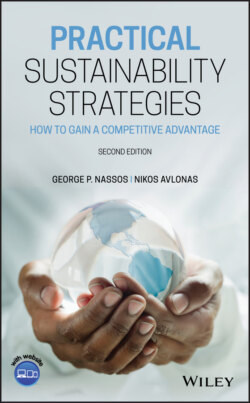Читать книгу Practical Sustainability Strategies - George P. Nassos - Страница 25
CSR TODAY: FROM SHAREHOLDER VALUE TO STAKEHOLDER VALUE
ОглавлениеCorporations today are being met by greater pressure from consumer and stakeholder groups to act upon societal and environment obligations. In essence, their actions are to mitigate the negative impact their activities are having upon the wider world. More and more, business leaders are themselves coming to the realization that their activities reach beyond the sphere of the business marketplace, impacting social, environmental, and political realms as well, and often negatively, and have implemented various measures, such as voluntary CSR reporting and recycling programs, to counteract the social and environmental tolls of global business.
With the rise of consumer education and activism, global social consciousness has become a hot topic of discussion, with business leaders jumping at the chance to exert themselves as champions of the people, and promote their businesses as “green” or “socially responsible.” And in the wake of a continually evolving set of ethical business guidelines comes the redefinition of the very concept of business. No longer is the “shareholder value prospect,” that is, maximum profit, the only player in the game, but its rival, CSR, a largely stakeholder and consumer concern, has emerged as the new MVP, or Most Valuable Priority. This reshuffle of priorities reflects the ability of globally responsible and creative business leaders to remain profitable while expending company resources toward the betterment of society, the transparency of business, and the protection of the environment.
Stakeholders—customers, employees of all ranks, suppliers, partners, affiliated institutes and governments, shareholders, and “owners”—represent the most fertile and diverse source of easily procured information available to a business or an organization. It should, therefore, come as no surprise that stakeholder engagement and dialogue is crucial for the profitability and continued existence of a company, as stakeholder opinions can be utilized to guide its vision and mission, and reflect on its performance. To simultaneously realize the potential of stakeholder groups, and to retain their valuable insights, a company must be willing to engage stakeholders in frequent dialogue, weigh their opinions, and allow them to participate in various decision-making processes. If this is not done, the company runs the risk of losing stakeholder capital—whether this is monetary, intellectual, or labor capital—which could prove potentially catastrophic to the life of the company in the long term.
Follow-up and feedback with stakeholders provide a cycle of opportunity for the growth and improvement of a company. Diverse stakeholder groups, when engaged in frequent dialog, can steer a company in a profitable and productive direction through the provision of perspectives on a variety of issues, from within a range of industries, geographic locals, demographic groups, and cultural backgrounds. For efficient and effective stakeholder dialog to be established, constant, clarifying communication between parties is essential, such as the identification of common goals among stakeholder groups and the company, as is the engagement and participation of stakeholders in relevant fora. Building relationships that transcend traditional business boundaries is a proven way to involve stakeholders in the mission of the company on a personal and emotional level, and evokes a genuine desire to learn from partnerships.
